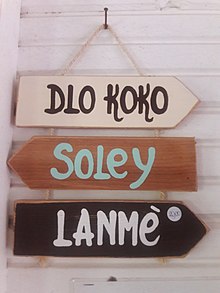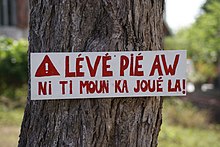Antillean Creole
Antillean Creole is spoken natively, to varying degrees, in Haïti, Saint Lucia, Grenada, Guadeloupe, Îles des Saintes, Martinique, Saint-Barthélemy (St. Barts), Dominica, French Guiana, Trinidad and Tobago, and Venezuela (mainly in Macuro, Güiria and El Callao Municipality).Antillean Creole has approximately thirteen million speakers and is a means of communication for migrant populations traveling between neighboring English- and French-speaking territories.In a number of countries (including Dominica, Grenada, St. Lucia, Trinidad, Brazil (Lanc-Patuá) and Venezuela) the language is referred to as patois.Conversely, it is widely used on the islands of Dominica and Saint Lucia; though they are officially English-speaking, there are efforts to preserve the use of Antillean Creole, as there are in Trinidad and Tobago and its neighbour, Venezuela.In recent decades, Creole has gone from being seen as a sign of lower socio-economic status, banned in school playgrounds,[5] to a mark of national pride.Since the 1970s, there has been a literary revival of Creole in the French-speaking islands of the Lesser Antilles, with writers such as Raphaël Confiant and Monchoachi employing the language.In 1638, Dyel du Parquet decided to have Fort Saint Louis built to protect the city against enemy attacks.Christopher Columbus named the island after the day of the week on which he spotted it, a Sunday (Latin: dies Dominica), on 3 November 1493.France had a colony for several years and imported slaves from West Africa, Martinique and Guadeloupe to work on its plantations.[6] Other features of this creole also include doubling to emphasize a sentence, the word "point" to inflect the negative, and the non-distinguished adverbs and adjectives.According to Jesuit missionary Pierre Pelleprat, French settlers would change their way of speaking to a simpler form to be more accommodating to the enslaved people.[6] For example, to say "I have not eaten" settlers would say "moi point manger" even though the proper French translation is "Je n'ai pas mangé".Form Personal pronouns in Antillean Creole are invariable so they do not inflect for case as in European languages such as French or English.Kaz ou - Your house, Kouto'w - Your knife Madanm li - His wife, Sésé'y - Her sister The indefinite article is placed before the noun and can be pronounced as on, an, yon, yan.sa'a He has come He hasn't come pa'a Ng'a palé Mwen pa'a palé M'a ka palé Ng'ay alé M'a kay alé We had said We hadn't said té'é Yo té'é enmen Yo pa té'é enmen po'o Sé timanmay-la pò'ò fè The children had not yet done Y'all had not started yet Verbs in Creole are invariable and unlike French or English have no inflection to distinguish tenses.Martinican Creole is widely spoken in Martinique which had mixed between French and African languages developed between the white settlers and the slaves from Africa who has settled in the New World.Martinican Creole is a regional language because the island has European, British, French, Spanish, Portuguese, Indians (Tamils), Blacks (Africans), Martinicans, Caribs and others where Europe meets Tropical Paradise as part of Overseas France and a European region which became an Overseas département on 19 March 1946.The immigrants establishing local communities of Blanchisseuse, Champs Fleurs, Paramin, Cascade, Carenage, Laventille, etc.Today, Trinidadian French Creole can be found spoken in regional pockets among the elders, particularly in the villages of Paramin and Lopinot.
Dlo Koko (" coconut water ", from French de l'eau de coco )
Soley ("Sun", from soleil )
Lanmè ("the sea", from la mer )



ISO 639 codeFrench AntillesGuadeloupeMartiniqueDominicaGrenadaSaint LuciaTrinidad and TobagoLanguage familyFrench CreoleISO 639-3Guadeloupean CreoleDominican CreoleMartinicanSaint LucianGlottologLinguasphereUnicodecoconut waterFrench-based creoleLesser AntillesFrenchEnglishAfrican languagesAntillesCaribbean IslandsGreater AntillesHaïtiÎles des SaintesSaint-BarthélemyFrench GuianaVenezuelaMacuroGüiriaEl Callao MunicipalityUnited States Virgin IslandsBritish Virgin IslandsCollectivity of Saint MartinLanc-PatuápatoisRaphaël ConfiantMonchoachiÉdouard GlissantPierre Belain d'EsnambucCaribbeanSaint-PierreSt. ChristopherFranceCardinal RichelieuCompagnie de Saint-ChristophesugarcaneplantationsJacques Dyel du ParquetSaint Kitts and NevisFort RoyalFort Saint LouisloanwordsGrenadian CreolePetit MartiniqueMartinique ChannelCompagnie des Îles de l'AmériqueCardinal MazarinlivresHouëlMarie-GalanteLa DesiradeSaintesKnights of MaltaSaint BarthélemySaint MartinCompagnie des Indes occidentalesEastern CaribbeanChristopher ColumbusIsland CaribsWest AfricaTrinidadEl DoradoKing Charles III of SpainAlveolarPalatalGlottalPlosiveaffricatevoicelessvoicedFricativeApproximantvelar fricativeCentralClose-midOpen-midConsonantsSemivowelsVowelsNasal vowelsGuadeloupe CreoleHaitian creoleoral consonantoral vowelnasal vowelnasal consonantNew WorldArawaksSpanishKing Louis XIV of FranceCode NoirAfricaLouisiana CreoleFrench CaribbeanEuropeOverseas FranceOverseas départementDominican Creole FrenchSaint Lucian Creole FrenchGrenadian Creole Frenchlingua francaSt. LuciaTrinidadian French CreoleCedula of PopulationFrench RevolutionBlanchisseuseParaminCarenageLaventilleLopinotHaitian